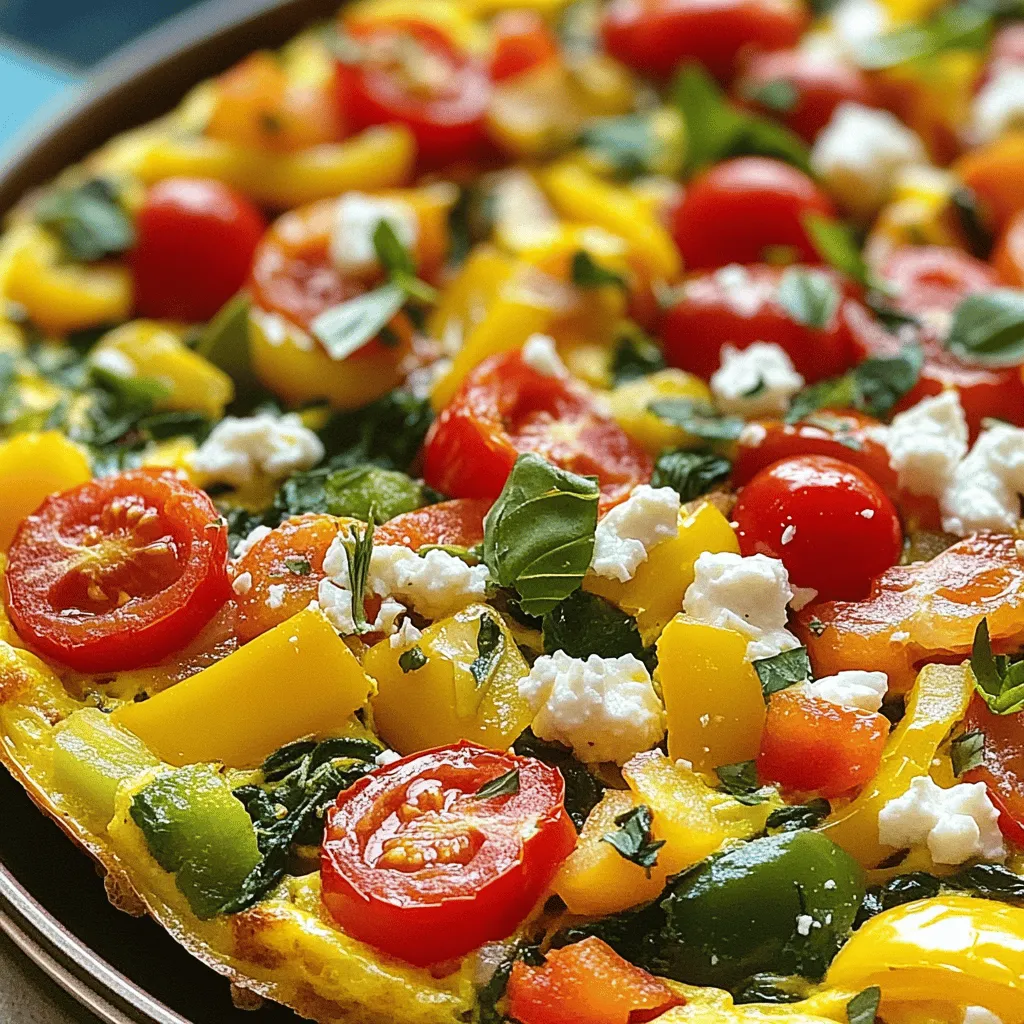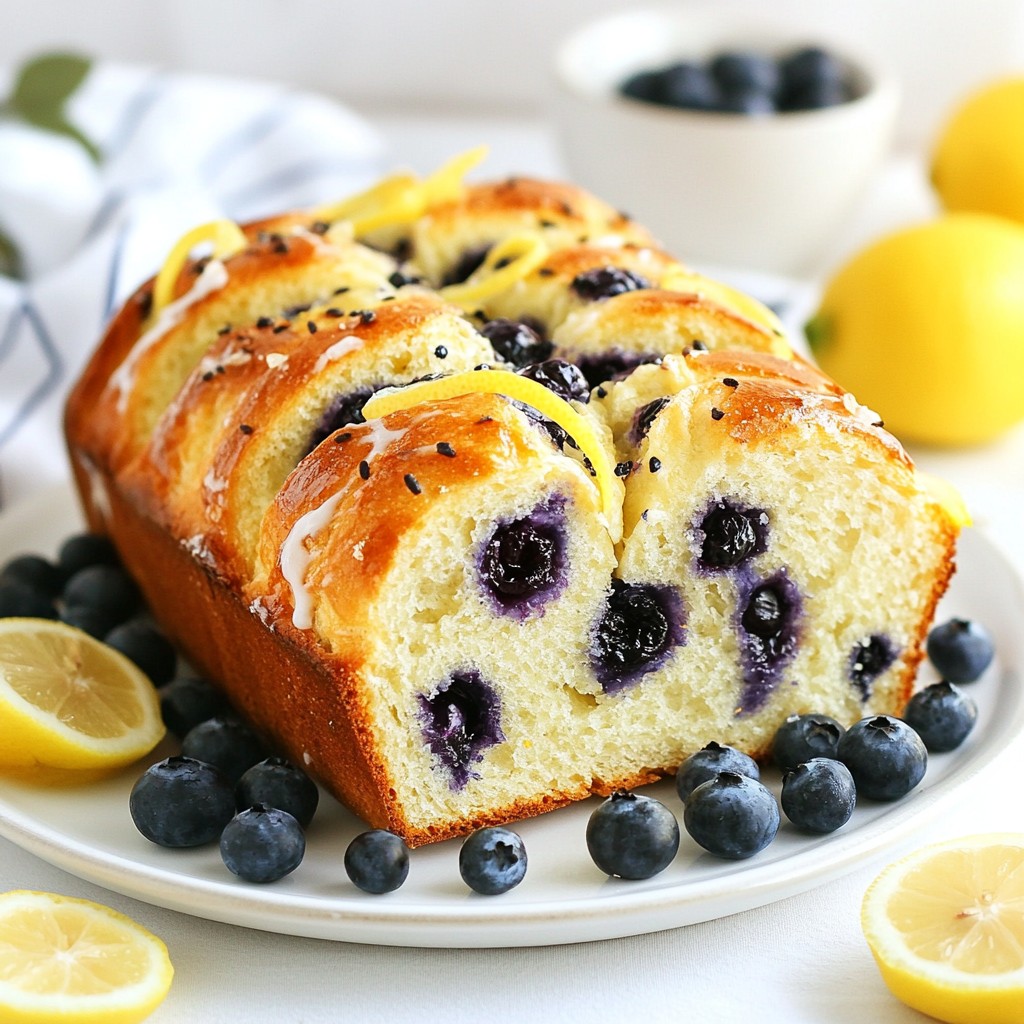Looking for a quick and flavorful meal idea? This Easy Frittata Recipe has you covered! With simple ingredients and easy steps, you can whip up a delicious frittata in no time. Perfect for breakfast, lunch, or dinner, it’s a versatile dish that fits any occasion. Plus, I’ll share tips, variations, and storage info to help you create the perfect frittata every time. Let’s dive in!
Ingredients
The right ingredients make a great frittata. Here’s what you need to gather.
List of Ingredients
– Eggs and Dairy Options
– 6 large eggs
– 1/2 cup milk (use plant-based milk if you prefer)
– Vegetables and Add-ins
– 1 cup bell peppers, diced (try red, yellow, and green)
– 1 cup baby spinach, chopped
– 1/2 cup cherry tomatoes, halved
– 1/4 cup red onion, finely chopped
– 1/2 cup feta cheese, crumbled (or any cheese you like)
– Seasonings and Garnishes
– 1 tablespoon olive oil
– Salt and pepper to taste
– Fresh herbs for garnish (like basil or parsley)
These ingredients create a veggie-packed frittata. Feel free to swap out any veggies or cheese. This recipe is flexible and fun. You can personalize it to suit your taste.
Step-by-Step Instructions
Preparation Steps
Preheating the Oven
First, preheat your oven to 375°F (190°C). This step is key to getting a perfect frittata. You want it hot from the start to cook evenly.
Whisking the Egg Mixture
Next, grab a large bowl. Add 6 large eggs and 1/2 cup of milk. You can use plant-based milk if you prefer. Whisk these together well. Add salt and pepper to taste. Mix until everything is smooth and frothy.
Sautéing Vegetables
In a 9-inch oven-safe skillet, heat 1 tablespoon of olive oil over medium heat. Once hot, toss in 1/4 cup of finely chopped red onion. Cook for about 2-3 minutes until it softens. Then, add 1 cup of diced bell peppers. Cook them for another 2-3 minutes, stirring often. Finally, mix in 1 cup of chopped baby spinach and 1/2 cup of halved cherry tomatoes. Keep cooking until the spinach wilts, about 1-2 minutes.
Cooking the Frittata
Pouring the Egg Mixture
Now, it’s time to pour your egg mixture over the vegetables in the skillet. Use a spatula to lift the veggies gently, so they mix well with the eggs. This helps to spread the flavors evenly.
Initial Cooking on the Stove
Let the frittata cook on the stove for about 2-3 minutes. You’ll see the edges start to set up. This gives it a nice base before baking.
Baking in the Oven
Carefully transfer the skillet to your preheated oven. Bake for 15-20 minutes, or until the frittata is puffed and the center is set. When it’s done, take it out and let it cool slightly. Cut into wedges and serve warm. For a nice touch, add fresh herbs for garnish. Enjoy your delicious creation!
Tips & Tricks
Perfecting Your Frittata
Achieving the Right Texture
To get a fluffy frittata, whisk the eggs well. Mix in the milk until it’s smooth. This adds air and helps with fluffiness. Cook it slowly on low heat. This way, the eggs set gently without becoming rubbery.
Recommended Cookware
Use a 9-inch oven-safe skillet for the best results. Cast iron works great, but non-stick also does well. Make sure to grease the pan well with olive oil. This helps your frittata slide out easily.
Flavor Enhancements
You can add herbs for more flavor. Fresh basil, parsley, or chives work well. A pinch of red pepper flakes adds heat. For a twist, sprinkle some cheese on top before baking. This gives a lovely, rich taste.
Serving Suggestions
Complementary Side Dishes
Serve your frittata with a light salad. A fresh green salad or a fruit salad pairs well. You can also add toast for crunch. It makes the meal feel complete and satisfying.
Ideal Presentation Tips
Cut the frittata into wedges for serving. Place them on a nice plate. Garnish with fresh herbs on top. This makes the dish look colorful and inviting.
Storing and Reheating Leftovers
Store leftovers in an airtight container. Keep them in the fridge for up to four days. To reheat, use a microwave or an oven. Heat it until warm, not too long, to keep it soft.

Variations
Ingredient Swaps
Choosing Different Vegetables
You can change the vegetables in your frittata. Use what you have on hand. Try zucchini, mushrooms, or even broccoli. Each veggie adds its own flavor. This keeps the dish fresh and exciting.
Cheese Alternatives
Feta cheese is great, but other cheeses work too. Try goat cheese for a tangy twist. Cheddar adds a rich, sharp taste. You can even skip cheese for a lighter meal.
Herb and Spice Infusions
Fresh herbs like basil or parsley make great additions. You can try thyme or oregano for a different taste. If you like heat, add red pepper flakes. These small changes can give your frittata a new life.
Dietary Adaptations
Vegan Frittata Options
You can make a vegan frittata with chickpea flour. Mix it with water to create a batter. Add your favorite veggies and spices for flavor. Bake just like the egg version.
Gluten-Free Considerations
Most frittata recipes are gluten-free. Just stick to fresh veggies and eggs. If you add any packaged ingredients, check for gluten-free labels.
Low-Carb Variations
For a low-carb frittata, focus on non-starchy veggies. Spinach, zucchini, and bell peppers are perfect choices. Skip the cheese if you want to cut carbs even more.
By exploring these variations, you can create a frittata that suits your taste and diet. Try these swaps to make your meal even better.
Storage Info
Storing Leftovers
To keep your frittata fresh, store it properly. First, let it cool to room temperature. Then, wrap it tightly in plastic wrap or put it in an airtight container.
– Refrigeration Guidelines: Store your frittata in the fridge for up to four days. Make sure the container is sealed well to prevent drying.
– Freezing Instructions: You can freeze the frittata for up to three months. Cut it into slices, then wrap each piece in foil. Place them in a freezer bag to save space.
– Best Practices for Reheating: To reheat, thaw in the fridge overnight if frozen. Use an oven or a skillet to heat it gently. Avoid microwaving, as it can make the frittata rubbery.
Shelf Life
Knowing how long your frittata lasts is key.
– How Long It Lasts in the Fridge: When stored correctly, a frittata lasts about four days in the fridge.
– Signs of Spoilage: Check for any off smell, discoloration, or mold. If you see any of these, it’s best to toss it.
– Safe to Eat Recommendations: Always trust your senses. If it looks or smells bad, don’t eat it. When in doubt, throw it out!
FAQs
Common Questions About Frittatas
What is the difference between a frittata and an omelette?
A frittata is cooked slowly and often finished in the oven. It mixes ingredients into the eggs. An omelette cooks quickly and is folded over fillings. Frittatas are thicker and can include more ingredients. They are perfect for using up veggies or leftovers.
Can I make a frittata ahead of time?
Yes, you can make a frittata ahead of time. It stores well in the fridge for up to three days. Just reheat it gently in the oven or microwave. This makes it a great option for meal prep.
How can I customize my frittata for different diets?
You can easily adjust a frittata to fit many diets:
– For vegan, swap eggs for a chickpea flour mixture.
– For gluten-free, avoid any bread or grains.
– For low-carb, focus on veggies and omit starchy foods.
Troubleshooting
What to do if my frittata is too dry?
If your frittata turns out dry, it may have cooked too long. Next time, check it earlier. You can also add more milk or cheese for creaminess. A side of salsa or sauce can help add moisture.
How to fix an undercooked frittata?
If your frittata is undercooked in the middle, return it to the oven. Bake at 375°F for a few more minutes. You can cover it with foil to prevent the top from browning too much.
Tips for preventing sticking in the pan.
To prevent sticking, use a non-stick skillet or a well-seasoned cast iron pan. Always grease the pan with olive oil before adding ingredients. You can also run a spatula around the edges while cooking. This helps loosen it from the sides.
In this blog post, we explored how to make a delicious frittata. We covered key ingredients, from eggs and dairy to fresh veggies. I shared step-by-step instructions, tips for perfecting texture, and ways to customize your dish. You can adapt your frittata to fit different diets and learn storage tips for leftovers too.
A frittata is a fun dish to try. With many variations, it can fit any meal. Enjoy experimenting with flavors and ingredients!




